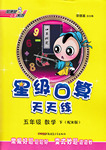题目内容
I had as much fun sailing the seas as I now dowith students.
A. working B. work
C. to work D. worked
练习册系列答案
 星级口算天天练系列答案
星级口算天天练系列答案 芒果教辅达标测试卷系列答案
芒果教辅达标测试卷系列答案
相关题目
题目内容
I had as much fun sailing the seas as I now dowith students.
A. working B. work
C. to work D. worked
 星级口算天天练系列答案
星级口算天天练系列答案 芒果教辅达标测试卷系列答案
芒果教辅达标测试卷系列答案